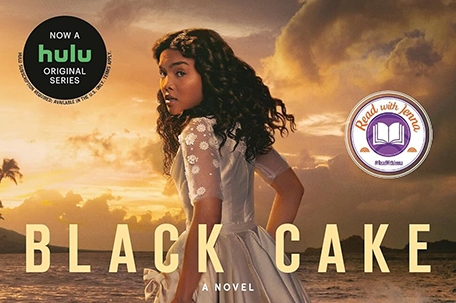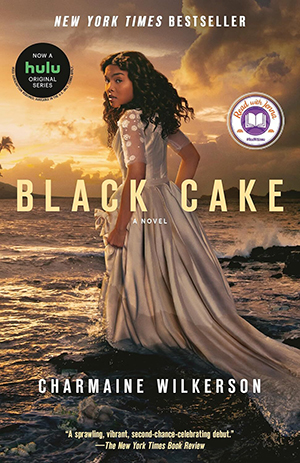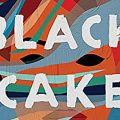
By Constance Garcia-Barrio
“Black Cake,” the title of Charmaine Wilkerson’s 2022 novel, hints at something sweet, dark, and possibly tied to African heritage.
The story unfolds on an unnamed Caribbean Island: “Their island was one of the smaller countries on Earth, but it had one of world’s largest natural harbors,” the text reads. There, a Chinese man, Lin, who, like some of his compatriots, arrives in the West Indies in the late 1800s as a worker to help replace enslaved Black laborers. Lin stays and starts a family with a local woman. He does well for a time with his store, Lin’s Dry Goods & Sundries. However, his drinking and gambling at cockfights leads the woman to flee, leaving Lin and their daughter behind.
The daughter, Covey, short for Coventina, becomes, at 17, a champion swimmer and a stunning girl. When Lin’s gambling mires him in hopeless debt, the lender — a big brutal man — forces Lin to let him marry Covey. She detests him but goes through with the ceremony.
However, at the wedding reception, the groom dies after eating black cake, a rich boozy dessert made with butter, eggs, flour, spices, fruit, and other ingredients and served on festive occasions.
In the confusion following the groom’s death, Covey slips out of the reception hall and into a raging storm. When Lin, other guests, and the police search for Covey, they only find her sopping wedding dress on the beach smeared with icing from the black cake. Most people believe that Covey has drowned, but she manages to leave the country and assume a new identity.
Fast-forward four decades. Covey’s grown son and daughter, Byron, and Benny (Benedetta) respectively, learn the truth about Covey’s life, including that they have a half-sister, thanks to a recording Covey has made before dying. She has instructed her lawyer to play it only after her demise.
“Forgive me for not telling you any of this before,” Covey’s voice says. “Things were different when I was your age. Things were different for women …especially if you were from the islands.”

By stipulating that Byron and Benny, who’ve become estranged, listen to the recording together, Covey ensures that her children will come face to face again. The timeline goes back and forth between 2018, as Byron and Benny work out their differences, and Covey’s past, as they listen to her recording.
Distinctive characters, including Byron and Benny, populate the books pages. Benny, thirty-something, six feet tall, bisexual, and multi-racial, has had trouble fitting in, especially in college:
“Benny, not black enough. Benny, not white enough. Benny, not straight enough. Benny, not gay enough.”
Benny drops out of college against her parents’ wishes to take cooking classes abroad. A superb cook, she can “smell the weather in a handful of flour and taste the earth in a spoonful of sugar cane.” Inspired by the black cake she used to make at her mother’s side, Benny dreams of one day opening a café.
Byron, an eligible bachelor 10 years older than Benny, and a successful oceanographer, has gained professional stature on a more traditional path. Byron has become the go-to expert when the media want a quote about the ocean’s health. He speaks of the urgent need to map the bottom of the ocean. That information would help prevent tsunamis among other benefits, he says. But despite his knowledge, passion, and camera appeal, he’s passed over twice for a promotion he deserves.
A crisp, entertaining read, the novel nevertheless tackles issues such as racism. Lin, like Chinese men who faced discrimination in the U.S. when they helped to build the Transcontinental Railroad, also did grueling work in the Caribbean. Lin struggles before he meets with success — arsonists burn down his store because he’s Chinese. They lump him together with other merchants of Asian ancestry, although unlike them, Lin pays his employees decent wages.
“Black Cake” also offers an enlightening look at culinary history and the diaspora of food and recipes. The novel traces the introduction of sugar to different countries. The story also shows how certain dishes mean different things to the people who eat them. For Byron, black cake “was essentially a plum pudding handed down to the Caribbean by colonizers from a cold country.” For Benny, the dessert has emotional ties and represents a cherished part of her heritage.
The novel also takes an intriguing look at the recent trend of leaving recordings for loved ones to hear after one’s death. In some situations, people with terminal illnesses leave a video for their family, death doulas, or death midwives, say. In other cases, the dying person records a favorite song that also includes the sound of their heartbeat, according to music therapists.
Covey’s decision may prompt readers to ask themselves whether it’s best to tell one’s truth in life, when family members can ask questions, or to record heartfelt ideas for loved ones to hear later.
Part of “Black Cake’s” fast pace comes from the vivid settings where the characters live — the Caribbean, London, Scotland, Florida, and California — as some characters stay one step ahead of their old identities. Forged documents sometimes smooth their way.
The novel sometimes threatens to burst at the seams with characters of different backgrounds and classes. One must take care not to confuse them.
Deaths aplenty occur in the book, though “Black Cake” is a story about not just survival but triumph. As if a counterbalance, romance reigns supreme. Despite hardships, characters are reunited with old lovers or nudged into unexpected love. In one case, a couple leans toward reigniting an old affair because of a surprise pregnancy.
In “Black Cake,” Charmaine Wilkerson has created a story as delicious as the dessert which gave the book its name.
“Black Cake”( Random House, 2022, list price $14.99).
















Leave a Comment